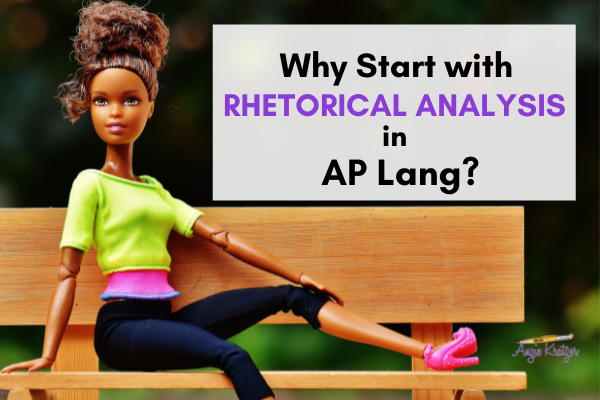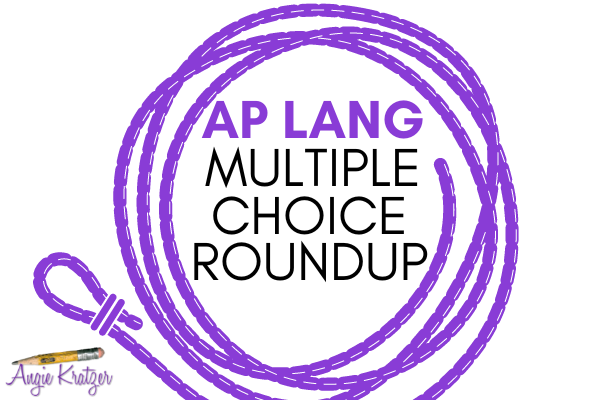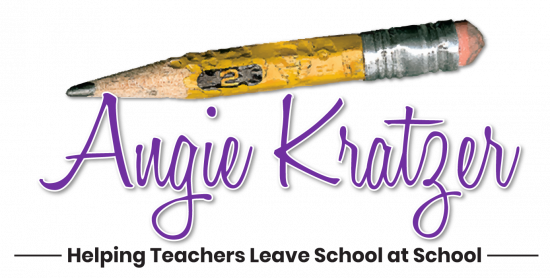If you are new to teaching AP English Language, expect imposter syndrome to creep in. I’m not smart enough. I have no business teaching this course. The kids are going to eat me alive.
Hear this: YOU ARE CAPABLE. It’s likely that you are the best reader, writer, and thinker in the room, so live in that truth. Here are some ideas to help you find your footing as you plan. There are many, many more you can tap into at angiekratzer.com, but these will get you started.

TIPS FOR YOUR FIRST YEAR TEACHING AP ENGLISH LANGUAGE
You might have asked to teach AP English Language or been volunteered for it. You might have trained years ago and waited for THE AP teacher to retire. English 10 students (and their parents) may have badgered you into teaching the course. Maybe you were bored and needed the challenge. Maybe you had been drinking when you filled out your course wish list.
Someone reading this post is a first-year teacher who was told the week before school started that she would be teaching AP English Language & Composition, that there was no time or money to send her to training, and that she would have five sections of 30 students. Girl, this post is for you. Hold on to something.

DEAR NEW AP LANGUAGE TEACHER,
We need to talk. You’re about to fall madly in love with a course, and because I used to be married (and I mean this in almost every sense of the word) to said course, I need to prep you. Listen up.

WHY START WITH RHETORICAL ANALYSIS IN AP LANG?
Whether school is on a traditional year-long schedule, a 4×4 block, or a modified block with A days and B days, there is a case to be made for starting with rhetorical analysis.

HOW TO PACE AP ENGLISH LANGUAGE ON THE BLOCK
When AP English Language & Composition was introduced in 1980(ish), AP Lit teachers were skeptical. A whole course based on non-fiction? Cake walk. They soon learned the opposite; in so many ways, the course was more challenging than one rooted in fiction.
Times changed. When Lang was designed, the vast majority of American high schools were on a “traditional” schedule of 5-7 classes in the course of a day over a span of 180 days. The English universe was based on reading fiction, writing about fiction, experimenting with creative writing, and teaching grammar and usage outside the context of writing. AP Lang was a completely separate entity, what some considered to be an experimental elective. Once it became more accepted and offered in more high schools as a standard course for juniors or seniors, school districts began weaving state standards into the course. In my school district, the class was known as AP English 11 and then AP English III. I was to teach as survey of American literature as well as the College Board skill set. Here’s how to squeeze it all in.

THE AP LANG MULTIPLE CHOICE BLOG POST ROUNDUP
Find all of Angie’s blog posts about the multiple choice portion of the exam in one spot.

PEP TALK/TRUTH BOMB FOR NEW AP LANG TEACHERS
Watch this quick video to hear some truths about teaching AP Language.

COMMUNITY!
There are so many excellent Facebook groups for AP Language teachers. Here are my favorites:
AP Language and Composition Teachers is a large group (12,000 teachers strong!) of smart, helpful teachers who will help you along the way. The administrator is an exam table leader, and she runs a tight ship.
AP Language and Composition Resource Group for Teachers is a warm, welcoming space for newbie questions. The admin is a long-time veteran AP Language teacher.
High School English with Angie Kratzer is a small but mighty group of teachers! I often posts resource updates and announcements on this platform for its audience of 1100 teachers.
And, of course you always have ME. Spam me with questions at [email protected]. I recently retired, so my time is yours.


